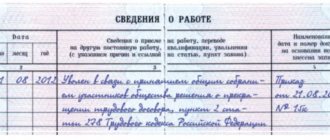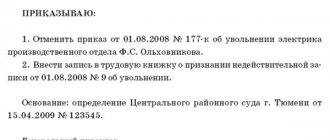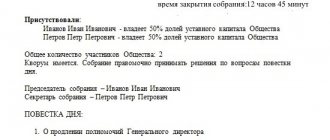Bulatova Evgenia “THORY OF LAW”
The director of the company is responsible for everything that happens in it, including the state of settlements with creditors. What about the former director? Read about this in this article.
According to the legal position set forth in the Resolution of the Plenum of the Supreme Court of the Russian Federation dated June 2, 2015. No. 21 “On some issues that arose with the courts when applying the legislation regulating the work of the head of the organization and members of the collegial executive body of the organization,” as well as in the Resolution of the Plenum of the Supreme Arbitration Court of the Russian Federation dated July 30, 2013. No. 62 “On some issues of compensation for losses by persons included in the bodies of a legal entity”, the head of the organization (including the former) on the basis of Part 2 of Art. 277 of the Labor Code of the Russian Federation compensates the organization for losses caused by its guilty actions only in cases provided for by federal laws (for example, Article 53.1 of the Civil Code of the Russian Federation, Article 44 of the Federal Law of February 8, 1998 No. 14-FZ “On Limited Liability Companies " and etc.).
The liability of a former director, founder, or member of a company is possible on various grounds. The most typical options for civil liability are recovery of damages and bringing to vicarious liability. Read more about the subsidiary liability of a director in our article: “Subsidiary liability of the director and founder in bankruptcy. Why is it dangerous to “leave” a company?”
The responsibilities of a company director are divided into types:
- material or property (liability of a participant (founder) of the Company within the authorized capital. In other words, if the Company’s debts to creditors and counterparties significantly exceed the actual value of the authorized capital and property owned by the Company, then the owner (founder) of such a Company has the right not to cover the difference in debt with personal money funds or personal property.
- administrative (responsibility of the founders for committing administrative offenses committed by them in the performance of duties related to the registration of the Company (violation of the law on advertising, intellectual property, carrying out activities without a license, etc.);
- subsidiary (liability in the form of additional punishment of persons who may be subject to penalties on a par with a debtor who is unable to repay his debts on his own);
- criminal (liability of the founder (participants) of the Company for deliberately conducting unfair business activities, the losses of which amount to more than 250,000 rubles).
Read more about the liability of a director in our article: “Criminal and property liability of the general director and founder for the debts of the Company.”
Payment terms under loan agreements
The Central Bank, in its letter dated March 27, 2021 No. IN-03-31/32, indicated that if the last day of the loan payment period falls on a non-working day, then the last date is considered such a non-working day (except Saturday and Sunday).
However, the Supreme Court pointed out that the Central Bank does not have such powers and its letters cannot be above the law. Failure to pay the payments stipulated by the contract during the period from March 30 to April 3, 2021 is not a delay in the fulfillment of obligations, and the postponement of the deadline for fulfilling an obligation to the next next business day cannot be considered as a violation of the deadlines for fulfilling obligations.
Statute of limitations for bringing to tax liability
The statute of limitations for bringing to tax liability is 3 years according to Article 113 of the Tax Code of the Russian Federation.
The statute of limitations for bringing tax liability is calculated differently depending on the offense.
If you committed a gross violation of the rules for accounting for income, expenses and/or taxable items, did not pay or did not fully pay a tax, fee, contribution, the statute of limitations begins to run from the day following the end of the corresponding tax period under Articles 120 and 122 Tax Code of the Russian Federation. This rule also applies to those taxes for which the tax period is a year.
In other cases, the period for bringing to tax liability is calculated from the day following the day of commission of the tax offense.
Penalty and writs of execution during the moratorium period
One of the consequences of the introduction of a moratorium is the cessation of accrual of penalties (fines and penalties) and other financial sanctions for non-fulfillment or improper fulfillment by the debtor of monetary obligations and mandatory payments for claims that arose before the introduction of the moratorium.
In addition, the introduction of a moratorium against the debtor also means that it is impossible for the creditor to obtain compulsory execution by presenting the writ of execution directly to the bank. However, it is worth considering that the moratorium applies only to the most affected sectors of the economy
8-921-903-17-16
| A fine of five times the cost of goods for each month and other changes to the law “On the Protection of Consumer Rights” |
Since 2021, creditors have the opportunity to hold the general director and other persons vicariously liable for the company’s debts when excluding a company that, in accordance with the law, is declared inactive.
Despite this, judicial practice has not yet been fully formed, however, several points can already be identified that should be taken into account before filing a claim in court.
Criminal liability of the former general director
For a director, whether former or current, criminal liability arises if he commits offenses that entail a violation of the rights of citizens or serious economic consequences for the company. Such acts are punishable by prison terms and large fines. The list of acts of the director for which criminal liability is provided is contained in the Criminal Code of the Russian Federation. One of the most pressing issues remains such an act as tax evasion from an organization , in particular, using various illegal schemes, liability for which is provided for in Art. 199 of the Criminal Code of the Russian Federation. More information about liability for committing a crime under Art. 199 of the Criminal Code of the Russian Federation, read the article: “Article 199 of the Criminal Code of the Russian Federation – Evasion of taxes and fees payable by the organization.”
In addition, the director may be subject to criminal liability:
- for an unjustified refusal to hire or an unjustified refusal to hire or unjustified dismissal of a pregnant woman or a woman with children under three years of age (Article 145 of the Criminal Code of the Russian Federation);
- for delay of wages for more than two months for mercenary purposes (Article 145.1 of the Criminal Code of the Russian Federation);
- for copyright infringement (Articles 146-147 of the Criminal Code of the Russian Federation);
- for exceeding his official powers (Article 201 of the Criminal Code of the Russian Federation);
- for commercial bribery (Article 204 of the Criminal Code of the Russian Federation).
At the end of the topic under consideration, I would like to emphasize once again that the director of the company signs tax returns and other documents for calculating taxes. Therefore, he bears personal responsibility for their non-payment, including criminal liability. The period of prosecution depends on the severity of the tax crime. If we are talking about non-payment of taxes on a large scale (Part 1 of Article 199 of the Criminal Code of the Russian Federation), then the statute of limitations is 2 years. If the amount of unpaid taxes is particularly large, or the crime was committed by a group of persons (Part 2 of Article 199 of the Criminal Code of the Russian Federation), then the period for prosecution increases to 10 years (Part 1 of Article 78 of the Criminal Code of the Russian Federation).
Thus, the conditional exit from the business or the dismissal of a director does not relieve the owners and such director from liability. The period of liability of a director after dismissal or liability of an owner after leaving the LLC's membership can, in some cases, reach 10 years.
Briefly about the law itself
Changes to the provisions “On Limited Liability Companies” were made by Federal Law No. 488-FZ of December 28, 2016, which added clause 3.1, which contains wording that if the failure to fulfill the obligations of the company is due to the fact that persons acted in bad faith or unreasonably, at the request of the creditor, such persons may be held subsidiarily liable for the obligations of this company.
Despite the fact that this clause was introduced in 2021, it became effective only from July 30, 2017. Those. if the company was expelled from the Unified State Register of Legal Entities on July 29, 2017, then it will not be possible to attract the general director or founders.
- All
- Inactive LLC
What is a dormant legal entity?
In accordance with Art. 64.2 of the Civil Code of the Russian Federation, did not submit reporting documents, and did not carry out transactions on at least one bank account during the year.
Which court should I file my application in – general jurisdiction or arbitration?
Today, judicial practice includes decisions from both courts of general jurisdiction and arbitration courts. However, it is worth filing for arbitration due to the fact that the dispute is of an economic nature and related to business activities.
The debtor's statement contains a note about the upcoming exclusion. Should I sue the LLC or wait for liquidation and sue the general director?
If you sue the LLC, the tax office will not be able to liquidate it until the court decision comes into force. However, such a decision may favorably influence the outcome of the case to further bring the manager or founder to subsidiary liability
So, the question on the agenda is: is it possible to avoid the “subsidy”?
We have devoted a separate expert material to this topic, “Bankruptcy without subsidiary liability is possible.”
Or a faster way is to leave a contact for feedback in the window below . We will answer your question personally and evaluate the prospects of falling under subsidiary liability and a possible line of defense in court.
Remember. Responsibility cannot always be avoided. We don't promise miracles. We promise high-quality protection of your rights and interests. You can always find a way to legally mitigate the punishment and minimize losses.
We help:
Protection of the former director of a bankrupt legal entity from subsidiary liability. We were able to defend the interests of the principal and prove that he is not a controlling person of the bankrupt debtor.
View document
How to prove bad faith or unreasonableness
By the decision of the Arbitration Court of the Sverdlovsk Region dated June 15, 2018 in case A60-69986/2017, it was refused to hold the director to subsidiary liability due to the lack of proof of dishonest or unreasonable behavior of the director or other persons in the company. In addition, the court pointed out that the legal entity was declared inactive and excluded on July 15, 2016, and the possibility of prosecution under this article came only from July 30, 2017 and the law does not have retroactive effect
The Seventeenth Arbitration Court of Appeal did not agree with the first instance and, by a resolution dated September 26, 2018, overturned the decision and brought the general director to subsidiary liability, i.e. satisfied the claim in full.
In the reasoning part, the appellate court indicated that the general director knew that the main debtor (the company) had caused damage to the plaintiff, in addition, there was a court decision to collect the debt that had entered into legal force, which the general director could not have been unaware of. In addition, acting reasonably and in good faith, he could not have been unaware of the failure to submit the necessary documents to the tax authorities.
Failure to file tax and accounting reports is either unreasonable or dishonest; otherwise, if the company intends to terminate its activities, such termination would occur through a liquidation procedure, with the repayment of existing debt, and, if there are insufficient funds, through a bankruptcy procedure.
Accordingly, bad faith and unreasonableness are proven by the materials of the case. Regarding the period of liquidation, the court indicated that at the time the plaintiff filed a claim in court in this case, the norm of paragraph 3.1 of Article 3 of the Federal Law “On Limited Liability Companies” was in force.
The Arbitration Court of the Moscow District has a different opinion. In his decision dated August 6, 2018 in case A40-249367/2017, he indicated that, by virtue of clause 1 of Art. 4 of the Civil Code of the Russian Federation, acts of civil legislation do not have retroactive force and apply to relations that arose after their entry into force. The law applies to relations that arose before its entry into force only in cases where this is expressly provided for by law.
Federal Law No. 488-FZ of December 28, 2016 does not directly indicate that the changes made to Federal Law No. 14-FZ “On Limited Liability Companies” apply to relations that arose before its entry into force.
Decision of the Arbitration Court of the Moscow District. In his decision dated August 6, 2018 in case A40-249367/2017
How to understand that the leader is a figurehead?
The nominee of a company director comes up during tax audits of its counterparties, as well as during the bankruptcy of the company.
Tax authorities, trying to prove the bad faith of taxpayers, interrogate the person listed in the Unified State Register of Legal Entities as the director of his counterparty.
The director's rating is a weighty argument for inspectors in a tax dispute.
What signs confirm the rating of a leader:
- the person declares that he was not the director of the company (for example, registration was carried out using a lost passport);
- the citizen directly confirms that he handed over his passport for registration in the Unified State Register of Legal Entities for a fee, but did not actually manage the company; -confirms its management, but cannot explain what the company does or talk about its activities;
- Immediately after his appointment to the position, the citizen transferred management of the company by proxy and was no longer involved in the company’s affairs.
A nominee director is a manager only according to documents, but in fact, the management of the company is carried out by a completely different person.
Briefly about the law itself
Changes to the provisions “On Limited Liability Companies” were made by Federal Law No. 488-FZ of December 28, 2016, which added clause 3.1, which contains wording that if the failure to fulfill the obligations of the company is due to the fact that persons acted in bad faith or unreasonably, at the request of the creditor, such persons may be held subsidiarily liable for the obligations of this company.
Despite the fact that this clause was introduced in 2021, it became effective only from July 30, 2017. Those. if the company was expelled from the Unified State Register of Legal Entities on July 29, 2017, then it will not be possible to attract the general director or founders.
- All
- Inactive LLC
What is a dormant legal entity?
In accordance with Art. 64.2 of the Civil Code of the Russian Federation, did not submit reporting documents, and did not carry out transactions on at least one bank account during the year.
Which court should I file my application in – general jurisdiction or arbitration?
Today, judicial practice includes decisions from both courts of general jurisdiction and arbitration courts. However, it is worth filing for arbitration due to the fact that the dispute is of an economic nature and related to business activities.
The debtor's statement contains a note about the upcoming exclusion. Should I sue the LLC or wait for liquidation and sue the general director?
If you sue the LLC, the tax office will not be able to liquidate it until the court decision comes into force. However, such a decision may favorably influence the outcome of the case to further bring the manager or founder to subsidiary liability
Why does a company need a formal (nominee) director?
Founders may attract a formal (nominee) director for various reasons. For example:
- the actual owner of the company does not have the right to manage the company openly (he is disqualified or is a civil servant);
- it is necessary to avoid signs of interdependence between companies managed by one person to eliminate tax risks;
- to maintain a special tax regime (STS), it is necessary to split one large company into several small ones;
- In order to win government procurement, one company needs to create the appearance of participation of companies independent from each other, which submit different price proposals, higher than those of the main organization.
Limitation of powers of a nominee director
Owners limit the powers of a nominee director in various ways:
- indicate in the charter a limitation on the amount of the transaction that it can carry out without the approval of the participants,
- a general power of attorney is issued to another person,
- the formal director is limited in access to the company's bank accounts, its seal and documentation.
How to prove bad faith or unreasonableness
By the decision of the Arbitration Court of the Sverdlovsk Region dated June 15, 2018 in case A60-69986/2017, it was refused to hold the director to subsidiary liability due to the lack of proof of dishonest or unreasonable behavior of the director or other persons in the company. In addition, the court pointed out that the legal entity was declared inactive and excluded on July 15, 2016, and the possibility of prosecution under this article came only from July 30, 2017 and the law does not have retroactive effect
The Seventeenth Arbitration Court of Appeal did not agree with the first instance and, by a resolution dated September 26, 2018, overturned the decision and brought the general director to subsidiary liability, i.e. satisfied the claim in full.
In the reasoning part, the appellate court indicated that the general director knew that the main debtor (the company) had caused damage to the plaintiff, in addition, there was a court decision to collect the debt that had entered into legal force, which the general director could not have been unaware of. In addition, acting reasonably and in good faith, he could not have been unaware of the failure to submit the necessary documents to the tax authorities.
Failure to file tax and accounting reports is either unreasonable or dishonest; otherwise, if the company intends to terminate its activities, such termination would occur through a liquidation procedure, with the repayment of existing debt, and, if there are insufficient funds, through a bankruptcy procedure.
Accordingly, bad faith and unreasonableness are proven by the materials of the case. Regarding the period of liquidation, the court indicated that at the time the plaintiff filed a claim in court in this case, the norm of paragraph 3.1 of Article 3 of the Federal Law “On Limited Liability Companies” was in force.
The Arbitration Court of the Moscow District has a different opinion. In his decision dated August 6, 2018 in case A40-249367/2017, he indicated that, by virtue of clause 1 of Art. 4 of the Civil Code of the Russian Federation, acts of civil legislation do not have retroactive force and apply to relations that arose after their entry into force. The law applies to relations that arose before its entry into force only in cases where this is expressly provided for by law.
Federal Law No. 488-FZ of December 28, 2016 does not directly indicate that the changes made to Federal Law No. 14-FZ “On Limited Liability Companies” apply to relations that arose before its entry into force.
Decision of the Arbitration Court of the Moscow District. In his decision dated August 6, 2018 in case A40-249367/2017
Is it possible to simultaneously hold the director and founder liable?
Yes, the law provides for simultaneous filing of a claim against the general director and founder. Positive judicial practice also exists, although in small quantities due to the short period of time for its sustainable formation.
In case A56-63660/2017, considered by the Arbitration Court of St. Petersburg and the Leningrad Region, the plaintiff asked to hold the general director and founder jointly and severally liable, as well as interest for the use of other people's funds. By a court decision dated March 29, 2018, the claims were satisfied in full.
The former general director did not agree with this decision; in the complaint he indicated that bringing the head of an organization to subsidiary liability is possible only if his head acts in bad faith and unreasonably, but the plaintiff did not provide any evidence of dishonesty or unreasonableness in his actions in the case materials.
However, the appellate court did not agree with the arguments, since failure to submit tax and accounting reports within 12 months cannot be considered normal practice and upheld the decision of the first instance.
What to do if you are a nominee director?
Before agreeing to become the sole executive body of a commercial organization, engage lawyers or competent lawyers to conduct a legal audit of the company.
Does your business need a legal audit?
We will calculate the cost of a legal audit based on your situation.
No extra costs or overpayments. Find out the cost
In addition, check publicly available sources for the presence of major disputes (card index of arbitration courts), the presence of large debts in enforcement proceedings (the website of the bailiff service), the presence of debts to pay taxes (the Federal Tax Service website), the presence of creditors’ intention to file a bankruptcy petition against the debtor (Fedresurs ).
Before signing an application to the Unified State Register of Legal Entities to enter information about the new manager, order a legal examination of the documents: the charter, the director’s employment contract, internal documents of the company.
In addition, be sure to obtain oral or written legal advice in which a lawyer will outline any future legal risks to you.
If they are already trying to bring you to justice, you cannot do without the help of a lawyer.
It is he who will help formulate the legal position on the case, collect the necessary evidence, achieve release from liability or at least reduce its amount.






